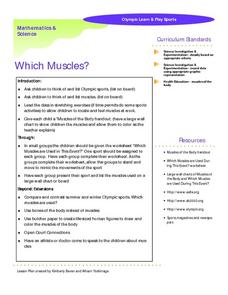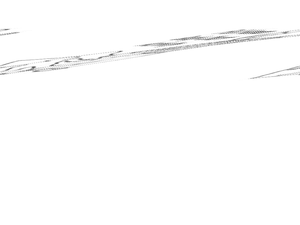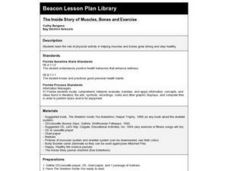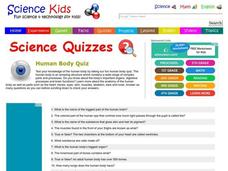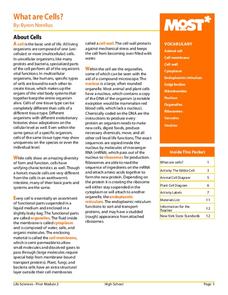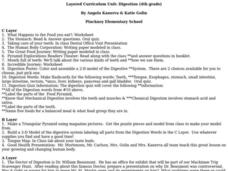Curated OER
The Animal Body and How it Moves
Spark interest in the body structure of vertebrates with this comprehensive and colorful learning exercise. Your biology class will explore the levels of organization, primary tissue types, and the main organ systems. Finally, they hone...
Curated OER
Human Muscles Coloring
In this human muscles worksheet, students are given a diagram of the human muscles on the front side of the body. They are given a key with a particular color for each muscle to be colored. Students find the muscle and color each.
Curated OER
Variation in Human Skin Color
Students explore factors that control variation in human skin color and the implications of this information for human society. They understand that skin color is no longer considered a credible scientific standard by which to classify...
Curated OER
Which Muscles?- Olympic Learn and Play Sports
In this math, science, and physical education worksheet, students brainstorm and study about the muscles that are used while participating in different Olympic sports. They color the muscle groups of the body by follow the directions...
Curated OER
Human Body Activity
In this human body worksheet, 2nd graders experiment making a full-sized human body portrait. Students discuss the human body organs and their functions. Students follow and complete 8 precise directives in making a human body portrait.
IBM
The Human Body
Every moment, the systems in your body are working together to keep you breathing, standing, and thinking. Elementary schoolers explore the human body and its systems with an impressive, 15-page lesson plan that should leave your...
Curated OER
You've Got to Have Heart
After reading an excellent description of the human heart, fifth graders look at a drawing of a human body, and choose the circle they think represents where the human heart is found. There are four circles inside the character's chest....
University of Minnesota
Virtual Neurons
It's electric! Young anatomists use Virtual Neurons software to build, control, and analyze complex nerve circuits within the body. Colorful and packed with content, class members enjoy interacting with the nervous system at a personal...
Curated OER
Exercise and Muscles
Eighth graders identify and label the primary and secondary muscles used to perform an exercise. Students perform an exercise on a weight machine to figure out which muscles are being used. Students illustrate the muscles used by...
Curated OER
The Inside Story of Muscles, Bones and Exercise
First graders explore how they can help their muscles and bones grow strong through the use of physical activity.
Curated OER
Tissues
Complete with teachers' notes for most of the slides, this is a tremendous presentation of the four types of tissues: epithelial, connective, nerve, and muscle. Each is displayed with pertinent vocabulary and photos of microscope slides...
Curated OER
Human Body Quiz
In this human body learning exercise, students complete short answer questions about the organs in the body and their functions. Students complete 20 questions.
Curated OER
What Are Cells?
Energize the cells of young biologists with an edible life science activity. Engaging learners in exploring the inner workings of plant and animal cells, this activity involves using colored jello and various sweet and tasty treats to...
Curated OER
Science Jeopardy
Wow! Review an entire semester of biology curriculum playing this Science Jeopardy game! The variety of topics is extremely broad, so you will need to review each question to find if they all apply to your course. As you find material...
Curated OER
Science: About Your Body
First graders examine body systems and demonstrate their competency in a quiz game show. Lessons cover the brain, heart, lungs, digestive system, muscles, and bones. Students , in teams, answer teacher-created questions in the game.
Curated OER
Bones and Muscles
Third graders are introduced to bones as the body's means of support and protection. They research bone facts and conduct an experiment with chicken bones. They identify and observe involuntary muscles at work.
MOST
What Are Cells?
What's in a cell, anyway? Kids read informational text on what makes up both animal and plant cells, including a page of vocabulary terms they will need to be familiar with (cytoplasm, ribosomes, vacuoles, etc.). Full-color images make...
Curated OER
Digestion
Fourth graders answer the question what happens to the food you eat? They complete a worksheet about the food you eat. They discuss the different types of teeth that we have. Students complete digestion poster in which they color and...
Project Oceanography
Fish Shape
A fish's size, fins, and shape can tell us a lot about them! Learners explore fish anatomy to see how species use camouflage, scales, shape, and coloration to survive. The lesson includes advanced vocabulary such as fusiform shape,...
Curated OER
LIFE IN SPACE Human Body: An Un-Earthly Home
Students examine an effect of zero gravity on the human body using a baby food jar, balloons and a jar with a large mouth.
Pleasant Valley Community School District
Integumentary System
This document can be used as a slide show to introduce your human body systems class to the integumentary system, also know as skin. Topics outlined include the roles of skin, details about its its layers, and color (cause and...
Curated OER
Essential Elements
A color-coded periodic table identifies organic elements, major minerals, and trace elements. Oxidation states are highlighted and types of chemical bonding are annotated. The electron energy level chart is explained. Though not all of...
Curated OER
Can You Name Parts of the Body?
Students share what they know about the human heart. In this early anatomy lesson, students discuss the location, shape, and importance of the human heart.
Curated OER
Nutrition in Me!
Third graders explain the basic healthy eating and physical activity concepts. In this healthy lifestyles lesson plan, 3rd graders describe two main components of a healthy lifestyle, demonstrate two different types of physical...





